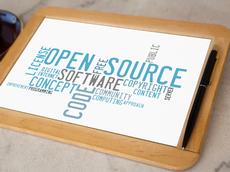 What is open core? Is a project open core, or is a business open core? That's debatable. Like open source, some view it as a development model, others view it as a business model. As a product manager, I view it more in the context of value creation and value capture...With open core, at least some of the code is proprietary. With proprietary code, a company hires engineers, solves business problems, and charges for that software. For the proprietary portion of the code base, there is no community-based engineering, so there's no process by which a community member can profit by participating. With proprietary code, a dollar invested in engineering is a dollar returned in code. Unlike open source, a proprietary development process can't return more value than the engineering team contributes...
What is open core? Is a project open core, or is a business open core? That's debatable. Like open source, some view it as a development model, others view it as a business model. As a product manager, I view it more in the context of value creation and value capture...With open core, at least some of the code is proprietary. With proprietary code, a company hires engineers, solves business problems, and charges for that software. For the proprietary portion of the code base, there is no community-based engineering, so there's no process by which a community member can profit by participating. With proprietary code, a dollar invested in engineering is a dollar returned in code. Unlike open source, a proprietary development process can't return more value than the engineering team contributes...
Red Hat
See the following -
Trends in Corporate Open Source Engagement
 In 1998, I was part of SGI when we started moving to open source and open standards, after having been a long-time proprietary company. Since then, other companies also have moved rapidly to working with open source, and the use and adoption of open source technologies has skyrocketed over the past few years. Today company involvement in open source technologies is fairly mature and can be seen in the following trends...
In 1998, I was part of SGI when we started moving to open source and open standards, after having been a long-time proprietary company. Since then, other companies also have moved rapidly to working with open source, and the use and adoption of open source technologies has skyrocketed over the past few years. Today company involvement in open source technologies is fairly mature and can be seen in the following trends...
- Login to post comments
U.S. Digital Services and Playbook: "Default to Open"
About this time last year, I laid out some trends I saw for the coming year in government take up of open source software. Looking back now, it appears those trends are not only here to stay, they are accelerating and are more important than ever. In particular, I wrote that "open source will continue to be the 'go to' approach for governments around the world" and that "increasingly, governments are wrestling with the 'how tos' of open source choices; not whether to use it."... Read More »
- Login to post comments
U.S. Government Seeks Reduced Use of Custom Software, Releases New Policy to 'Free the Code'
 As I've written before, there has been a shift, going back almost a decade, away from the debate over whether to use open source to a focus on the how to. The release by the Office of Management and Budget (OMB) of the U.S. Federal Source Code Policy on August 8th is the latest manifestation of this shift. It achieves the goal laid out in the Obama administration's Second Open Government National Action Plan (PDF) for improved access to custom software code developed for the federal government. The plan emphasized use of (and contributing back to) open source software to fuel innovation, lower costs, and benefit the public. It also furthers a long-standing "default to open" objective going back to the early days of the administration...
As I've written before, there has been a shift, going back almost a decade, away from the debate over whether to use open source to a focus on the how to. The release by the Office of Management and Budget (OMB) of the U.S. Federal Source Code Policy on August 8th is the latest manifestation of this shift. It achieves the goal laid out in the Obama administration's Second Open Government National Action Plan (PDF) for improved access to custom software code developed for the federal government. The plan emphasized use of (and contributing back to) open source software to fuel innovation, lower costs, and benefit the public. It also furthers a long-standing "default to open" objective going back to the early days of the administration...
- Login to post comments
United Arab Emirates (UAE) - Daman national health insurance company adopts RedHat
Red Hat, the leading provider of open source solutions, today announced that Daman, the United Arab Emirates’ (UAE’s) first specialized national health insurance company, has significantly reduced operational costs, improved stability and reliability and simplified management of its enterprise content management application by migrating to Red Hat Enterprise Linux operating platform. Read More »
- Login to post comments
Upstream Conference to Feature Open Source Maintainers
 Imagine the chaos that would occur if all open source software vanished with the snap of a finger. Picture the devices that would turn to bricks in our hands, the infrastructure that would fail, and the machinery that would fall silent. The truth is we probably don't stop to think about all the open source libraries, frameworks, and components we depend on-until something goes wrong. The extraordinary impact of open source is difficult to measure or quantify...Open source is a testament to human ingenuity, and it's not often that we take the time to celebrate what we-the creators and users of open source-have made together. We think it's time we did. That's why we're announcing a new type of open source event called Upstream. It's a one-day celebration of open source for the developers who use it and the maintainers that create it. We'd like you to join us on June 7 for this entirely virtual and free event where we'll focus on the creators behind essential open source packages and the developers who build amazing things with them.
Imagine the chaos that would occur if all open source software vanished with the snap of a finger. Picture the devices that would turn to bricks in our hands, the infrastructure that would fail, and the machinery that would fall silent. The truth is we probably don't stop to think about all the open source libraries, frameworks, and components we depend on-until something goes wrong. The extraordinary impact of open source is difficult to measure or quantify...Open source is a testament to human ingenuity, and it's not often that we take the time to celebrate what we-the creators and users of open source-have made together. We think it's time we did. That's why we're announcing a new type of open source event called Upstream. It's a one-day celebration of open source for the developers who use it and the maintainers that create it. We'd like you to join us on June 7 for this entirely virtual and free event where we'll focus on the creators behind essential open source packages and the developers who build amazing things with them.
- Login to post comments
US Defense Think Tank Calls for DoD to Adopt the Open Source VistA EHR and Avoid Closed and Proprietary EHRs.
 One of the most prestigious U.S. defense think tanks, the Center for a New American Security (CNAS), issued a white paper Thursday calling on the Department of Defense (DoD) to replace their existing dysfunctional “vendor-lock” medical records system with an electronic health records system (EHR) that is "extensible, flexible and easy to safely modify and upgrade as technology improves and interoperability demands evolve." The white paper warns that a "closed and proprietary" commercial EHR - such as the ones offered by Epic, Cerner or Allscripts - will lead to "vendor-lock” and isolation of health data. Read More »
One of the most prestigious U.S. defense think tanks, the Center for a New American Security (CNAS), issued a white paper Thursday calling on the Department of Defense (DoD) to replace their existing dysfunctional “vendor-lock” medical records system with an electronic health records system (EHR) that is "extensible, flexible and easy to safely modify and upgrade as technology improves and interoperability demands evolve." The white paper warns that a "closed and proprietary" commercial EHR - such as the ones offered by Epic, Cerner or Allscripts - will lead to "vendor-lock” and isolation of health data. Read More »
- Login to post comments
Using Open Source in the Enterprise - 13 CIOs Embracing Free and Open Source Software
 Open source enterprise use cases appear to be on the rise, at least anecdotally, with an increasing number of CIOs, IT directors and Chief Technology Officers telling CIO UK about investigating and adopting free and open source alternatives to proprietary software as they seek to gain freedom and flexibility, cut costs, increase agility, improve code quality and avoid vendor lock-in.
Open source enterprise use cases appear to be on the rise, at least anecdotally, with an increasing number of CIOs, IT directors and Chief Technology Officers telling CIO UK about investigating and adopting free and open source alternatives to proprietary software as they seek to gain freedom and flexibility, cut costs, increase agility, improve code quality and avoid vendor lock-in.
- Login to post comments
What Does Microsoft Have to Do to Earn FOSSers' Respect?
Microsoft may not have fully endeared itself into the FOSS rank and file with its recent attempt to hold hands with the open source community. Feelings are not unanimous regarding the commercial software giant's decision in April to front a company-owned subsidiary called "Microsoft Open Technologies."
- Login to post comments
What is open core?
- Login to post comments
What the History of Open Source Teaches Us About Strategic Advantage
 The free software movement started like many other movements: A group of bright, spirited people felt controlled by a greater power and rose up and took matters into their own hands. It's not that different from the American Revolution. The colonists were tired of being controlled by Great Britain, so they declared their independence and started building their own system of government and military, and creating their own cultures. The revolutionaries' methods were disorganized and improvised, but they ultimately proved to be effective. Same goes for the software revolutionaries...
The free software movement started like many other movements: A group of bright, spirited people felt controlled by a greater power and rose up and took matters into their own hands. It's not that different from the American Revolution. The colonists were tired of being controlled by Great Britain, so they declared their independence and started building their own system of government and military, and creating their own cultures. The revolutionaries' methods were disorganized and improvised, but they ultimately proved to be effective. Same goes for the software revolutionaries...
- Login to post comments
Who Writes Linux? Corporations, More Than Ever
Linux Foundation report shows for-profit companies provide 80-plus percent of kernel patches, with big role for mobile hardware developers Read More »
- Login to post comments
Why 2012 Is Shaping Up to Be a Banner Year for Linux in the Cloud
Will 2012 be the year that Linux begins to dominate the cloud? That's the prediction of many a pundit. Many individual users of Linux don't necessarily have uses for cloud storage and cloud services, but as Linux becomes more firmly entrenched in businesses, and as cloud computing advances in general, Linux and the cloud are converging faster than ever. Here are some strong signals of this trend.
- Login to post comments
Why 2018 Was a Breakout Year for Open Source Deals
 At the beginning of 2018, it didn't seem like the open source movement could get any bigger. Android, the world's most popular mobile operating system; websites including Facebook and Wikipedia; and a growing number of gadgets have open source software under the hood-literally, in the case of cars. The world's largest companies, including Walmart and JP Morgan Chase, not only use open source but have released their own open source software so the rest of the world can modify and share their code. Then, in June, Microsoft announced plans to buy GitHub, the platform used by millions of developers and companies, including Google and Walmart, to host popular open source projects, for $7.5 billion.
At the beginning of 2018, it didn't seem like the open source movement could get any bigger. Android, the world's most popular mobile operating system; websites including Facebook and Wikipedia; and a growing number of gadgets have open source software under the hood-literally, in the case of cars. The world's largest companies, including Walmart and JP Morgan Chase, not only use open source but have released their own open source software so the rest of the world can modify and share their code. Then, in June, Microsoft announced plans to buy GitHub, the platform used by millions of developers and companies, including Google and Walmart, to host popular open source projects, for $7.5 billion.
- Login to post comments
Why CoreOS Is A Game-Changer In The Data Center And Cloud
Offering Linux as a service, CoreOS has become the preferred distro for Docker -- and may go a long way toward making data centers more cloudlike...
- Login to post comments
Why Open Infrastructure Matters In The Cloud
When reading a recent article by Red Hat CEO Jim Whitehurst, I was struck by a comparison made between OpenStack and the interstate highway system. The article in Wall Street and Technology, called "OpenStack: Five things every executive needs to know," mostly focused on the high points of where OpenStack is in its development cycle.
- Login to post comments